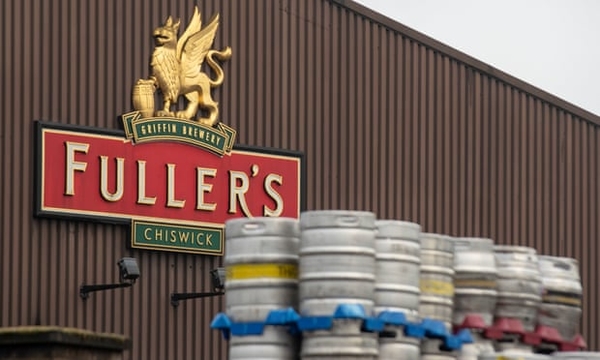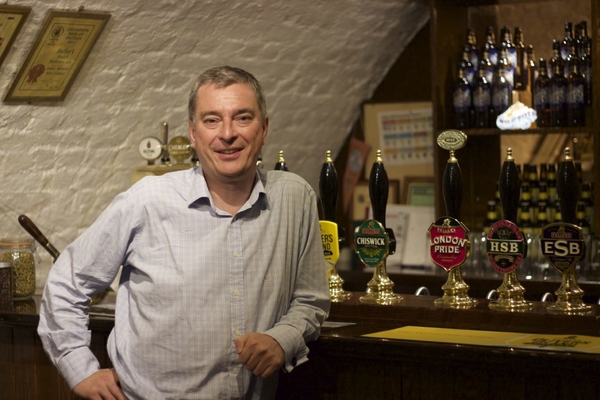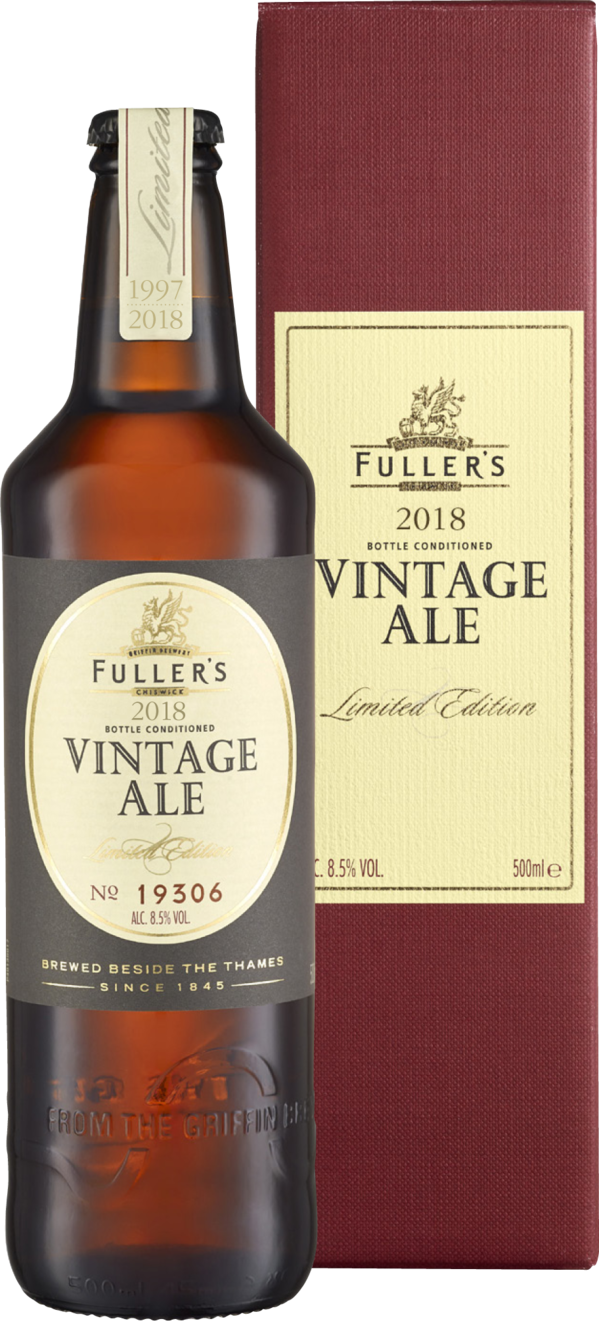Fuller's: end of family brewing in London
Added: Sunday, January 27th 2019

The sale of Fuller’s brewery and brands to Asahi of Japan brings to an end the long history of family brewing in London. One by one, the likes of Charrington, Courage, Manns, Taylor Walker, Truman and Watney have disappeared, with the revered Young’s of Wandsworth throwing in the towel in 2006.
There are now more than 100 small independent brewers in London, many producing beers of the highest quality. Nevertheless it’s tragic that an era of brewing in Chiswick dating back to the 1600s – the Fuller, Smith & Turner partnership was formed in 1845 – has ended with a giant global brewer buying such much-loved beers as London Pride and Extra Special Bitter.
Is it, as some people have suggested on social media, all down to greed? Is history repeating itself, as with the sale of Thrale’s brewery in Southwark in 1781 when Dr Samuel Johnson, a shareholder, coined the less than elegant expression: “We are not here to sell a parcel of vats and boilers, but the potentiality of growing rich beyond the dreams of avarice.”
In the 21st century, it’s more complicated than that. The families own 50 per cent of the business and will pocket most of the £250 million, and it’s unlikely that Richard Fuller or Michael Turner will be seen selling the Big Issue on Chiswick High Road in the near future.
But there’s a new elephant in the room in the form of a 21st century phenomenon: the global brewers. When AB InBev bought SAB Miller in 2016 for $100 billion it was the third biggest takeover in corporate history. It has created a colossus that accounts for one third of all the beer brewed in the world.
The awesome size of AB InBev means it can bulk buy raw materials at deep discounts that enable it to slash production costs and undercut rivals.
As a result, the likes of Asahi, Carlsberg, Heineken, Kirin and Molson Coors have been running to catch up. Asahi is a major lager producer of such brands as Super Dry, Grolsch, Peroni and Pilsner Urquell but it dipped a toe in the ale sector when it bought Meantime in Greenwich in 2016.
With Carlsberg buying London Fields, Heineken owning around half of Beavertown, AB InBev controlling Camden Town and Molson Coors reaping rich rewards with Doom Bar from Sharps, the globals are keen to cash in on the booming world-wide demand for craft beer.
For £250 million, Asahi gets a big modern brewery with a capacity of 200,000 barrels a year and award-winning ales such as London Pride, ESB and 1845, as well as Frontier lager that’s now Fuller’s second biggest brand. The Japanese group will also own the Dark Star and Gale’s beer brands, acquired by Fuller’s in 2018 and 2005 respectively, along with Cornish Orchards cider and Nectar Imports.
It also has the contract to supply beer to Fuller’s estate of 385 pubs and hotels, as well as the free trade, including supermarkets. Speculation that Asahi may close the Griffin brewery at Chiswick and move production to Meantime is unrealistic. The Greenwich brewery doesn’t have the capacity to produce the beers, though it’s possible that the popular Dark Star Hophead could move there.
On the other hand, the Asahi accountants will be keenly aware that the Chiswick site, overlooking the Thames, has a real estate value of around £100 million and could be turned into lucrative housing. But where else could Asahi produce the beers?

The second burning question is: Why did Fuller’s want to sell? It’s a highly successful business with profits of around £43 million a year.
But 90 per cent of the profits come from retailing. Profits from brewing have been falling for several years and this has led Fuller’s to join the well-worn path of brewers selling their production plants and becoming pub retailers. As some critics of Fuller’s have suggested, the writing has been on the wall for some time as the company busily built its retail side. As a result, it now owns more hotels than pubs.
Why is brewing less profitable? When I suggested in a Radio 5 Live interview that Progressive Beer Duty (PBD) could be a factor, some smaller brewers thought I was attacking the system.
Not so. I am a keen supporter of the independent sector and welcomed the introduction of PBD in 2002. It was brought in by the then Chancellor, Gordon Brown, and it gives a 50 per cent cut in excise duty to brewers producing up to 5,000 hectolitres a year and tapered relief up to 60,000 hectos.
The small brewers deserve the reductions. They don’t enjoy the “economies of scale” of bigger brewers, which means they can’t buy malt and hops at generous discounts. They don’t own estates of pubs where they can sell their beer direct and have to rely on sales to other brewers, pub companies and supermarkets. In many cases they are unable to accept the cheap prices pubcos and supermarkets demand.
The problem with the duty system, now renamed Small Brewers Relief (SBR) is that above the cut off of 60,000 hectos there is no relief at all. As a result, a number of middle-ranking family brewers have slashed their production volumes in order to qualify for SBR. One family brewer told me that if he hadn’t cut his volumes he would have gone out of business as he was surrounded by smaller brewers able to undercut him on price.
There is now widespread agreement at all levels of the brewing industry that SBR needs to be reviewed and the cut-off level increased. But that could take years to get Treasury agreement.
The more likely reason for the drop in Fuller’s profits from brewing is the fall in sales of cask beer. John Keeling (above), who retired as Fuller’s head brewer last autumn, says sales of cask at the Griffin brewery are down 10 per cent while sales of keg beer are up 20 per cent – and Fuller’s is a major cask beer brewer, with London Pride one of the country’s top brands.
Keeling says that cask, as a unique British beer style, should be treated as a premium product. It needs more careful handling by publicans who should be discouraged from keeping a cask on for more than three days.
He argues further that cask should be given a special tax band to support its unique position in British pub life – either a 20 per cent reduction in duty or the same duty level as cider.
But neither a review of SBR nor a cut in duty for cask beer will save Fuller’s as a family brewer. The deal is done and now Asahi is in charge.
I was asked on Radio 5 Live whether the quality of the beers will change. I don’t have a crystal ball. Unlike some global brewers, Asahi doesn’t have a poor reputation for beer quality. But global producers are always keen to reduce costs, which can mean using inferior ingredients.
What is possible in the short term is a reduction in the beer range. Asahi says it wants to turn London Pride into an “international brand”, which can only mean freeing up additional space in the brewery to produce more of that one beer.
Will Asahi keep on John Keeling’s Past Masters range of beers made with recipes from the 19th and early 20th centuries? Will the remaining Gale’s beers be killed off, including the rare “British lambic”, Prize Old Ale?
And of special concern to beer connoisseurs will be the fate of the two prize-winning bottle-conditioned beers, 1845 and Vintage Ale. The latter is awaited every year with the anticipation usually reserved for the latest vintage from Bordeaux.
The plan to turn London Pride into an international brand is a cause for great concern. Tankered around the world, it would cease to be a top-quality cask ale and would be sold predominantly in keg, can and bottle. The joke about Tokyo Pride may not be wide of the mark.
Speculation aside, we are left to mourn the demise of a once-proud London brewery run by families who stood against the tide of keg beer and merger mania in the 1960s and 70s and stayed true to quality and tradition. Many Fuller’s drinkers are now expressing a deep sense of betrayal that a family brewer has sold its birthright.






